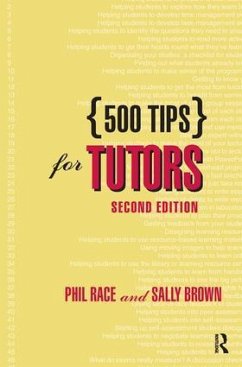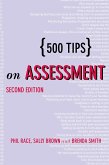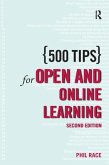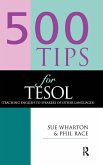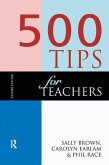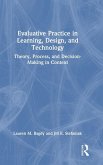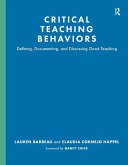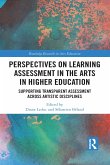- Gebundenes Buch
- Merkliste
- Auf die Merkliste
- Bewerten Bewerten
- Teilen
- Produkt teilen
- Produkterinnerung
- Produkterinnerung
Aimed at university and college lecturers, this stimulating resource presents hundreds of fresh, practical tips covering the entire spectrum of situations faced in teaching and learning. The structure allows you to dip in and use at your leisure.
Andere Kunden interessierten sich auch für
![500 Tips on Assessment 500 Tips on Assessment]() Sally Brown500 Tips on Assessment172,99 €
Sally Brown500 Tips on Assessment172,99 €![500 Tips for Open and Online Learning 500 Tips for Open and Online Learning]() Phil Race500 Tips for Open and Online Learning101,99 €
Phil Race500 Tips for Open and Online Learning101,99 €![500 Tips for TESOL Teachers 500 Tips for TESOL Teachers]() Phil Race500 Tips for TESOL Teachers153,99 €
Phil Race500 Tips for TESOL Teachers153,99 €![500 Tips for Teachers 500 Tips for Teachers]() Sally Brown500 Tips for Teachers101,99 €
Sally Brown500 Tips for Teachers101,99 €![Evaluative Practice in Learning, Design, and Technology Evaluative Practice in Learning, Design, and Technology]() Lauren M BagdyEvaluative Practice in Learning, Design, and Technology172,99 €
Lauren M BagdyEvaluative Practice in Learning, Design, and Technology172,99 €![Critical Teaching Behaviors Critical Teaching Behaviors]() Lauren BarbeauCritical Teaching Behaviors189,99 €
Lauren BarbeauCritical Teaching Behaviors189,99 €![Perspectives on Learning Assessment in the Arts in Higher Education Perspectives on Learning Assessment in the Arts in Higher Education]() Perspectives on Learning Assessment in the Arts in Higher Education153,99 €
Perspectives on Learning Assessment in the Arts in Higher Education153,99 €-
-
-
Aimed at university and college lecturers, this stimulating resource presents hundreds of fresh, practical tips covering the entire spectrum of situations faced in teaching and learning. The structure allows you to dip in and use at your leisure.
Produktdetails
- Produktdetails
- Verlag: Routledge
- 2. Auflage
- Seitenzahl: 146
- Erscheinungstermin: 1. September 2016
- Englisch
- Abmessung: 240mm x 161mm x 13mm
- Gewicht: 391g
- ISBN-13: 9781138151765
- ISBN-10: 1138151769
- Artikelnr.: 70070286
- Herstellerkennzeichnung
- Libri GmbH
- Europaallee 1
- 36244 Bad Hersfeld
- gpsr@libri.de
- Verlag: Routledge
- 2. Auflage
- Seitenzahl: 146
- Erscheinungstermin: 1. September 2016
- Englisch
- Abmessung: 240mm x 161mm x 13mm
- Gewicht: 391g
- ISBN-13: 9781138151765
- ISBN-10: 1138151769
- Artikelnr.: 70070286
- Herstellerkennzeichnung
- Libri GmbH
- Europaallee 1
- 36244 Bad Hersfeld
- gpsr@libri.de
Peter Smithson is Senior Lecturer in Geography at the University of Sheffield. Ken Addison is Senior Lecturer at the School of Applied Sciences, University of Wolverhampton, and Fellow and Tutor in Physical Geography at St Peter's College, University of Oxford. Ken Atkinson is Senior Lecturer in Geography at the University of Leeds., Sally Brown is Visiting Professor of Learning and Teaching at the Leeds Metropolitan University, and also at the Robert Gordon University in Aberdeen and Buckinghamshire Chilterns University College. She is also an independent higher education consultant, change manager and interim manager.
Chapter 1 Getting your students going; Chapter 1
1 Helping students to prepare to start learning; Chapter 1
2 Helping students to explore how they learn best; Chapter 1
3 Helping students to develop time
management skills; Chapter 1
4 Helping students to develop task
management skills; Chapter 1
5 Helping students to identify the questions they need to answer; Chapter 1
6 Helping students to read more actively; Chapter 1
7 Helping students to read more actively; Chapter 1
8 Organising your studies: a checklist for students; Chapter 2 Starting off, and working together; Chapter 2
9 Finding out what students already know; Chapter 2
10 Helping students to make sense of the learning programme; Chapter 2
11 Getting to know you; Chapter 2
12 Helping students to get the most from tutorials; Chapter 2
13 Helping students to benefit from seminars; Chapter 2
14 Helping students to make the most of small
group sessions; Chapter 2
15 Helping students to make the most of each other; Chapter 2
16 Helping students to learn from each other; Chapter 2
17 Helping students to find and use mentors; Chapter 2
18 Being an expert witness; Chapter 3 The programme itself: lectures, assignments and feedback; Chapter 3
19 Helping students to make the most of your lectures; Chapter 3
20 How not to lecture!; Chapter 3
21 What not to do with PowerPoint(TM)!; Chapter 3
22 Making the most of the overhead projector; Chapter 3
23 Compensating for other people's bad teaching!; Chapter 3
24 Helping students to make notes
not just take notes; Chapter 3
25 Helping students to write essays; Chapter 3
26 Helping students to write reports; Chapter 3
27 Helping students to learn in laboratories; Chapter 3
28 Helping students to plan their projects; Chapter 3
29 Getting feedback from your students; Chapter 4 Helping students to learn from resources; Chapter 4
30 Designing learning resources; Chapter 4
31 Helping students to use resource
based learning materials; Chapter 4
32 Using moving images to help learning; Chapter 4
33 Helping students to learn online; Chapter 4
34 Helping students to use the library or learning resource centre; Chapter 4
35 Helping students to learn from handouts; Chapter 5 Assessment: demonstrating evidence of achievement; Chapter 5
36 Helping students to see the big picture; Chapter 5
37 Helping students to set their sights high; Chapter 5
38 Helping students to set their sights high; Chapter 5
39 Giving face
to
face feedback to students; Chapter 5
40 Helping students into peer assessment; Chapter 5
41 Helping students into self
assessment; Chapter 5
42 Starting up self
assessment student dialogues; Chapter 5
43 Helping students to negotiate learning agreements; Chapter 5
44 Helping students to revise productively; Chapter 5
45 Helping students to pass exams; Chapter 5
46 What do exams really measure? A discussion checklist; Chapter 5
47 Helping students to get ready for vivas; Chapter 6 Skills for career and life in general; Chapter 6
48 Helping students to cope with being away from home; Chapter 6
49 Helping students to cope with stress; Chapter 6
50 Helping students to recover from two weeks off!; Chapter 6
51 Helping students to recover from failure; Chapter 6
52 Helping students to apply for jobs; Chapter 6
53 Helping students to put together their CVs; Chapter 6
54 Helping students to develop their interview skills;
1 Helping students to prepare to start learning; Chapter 1
2 Helping students to explore how they learn best; Chapter 1
3 Helping students to develop time
management skills; Chapter 1
4 Helping students to develop task
management skills; Chapter 1
5 Helping students to identify the questions they need to answer; Chapter 1
6 Helping students to read more actively; Chapter 1
7 Helping students to read more actively; Chapter 1
8 Organising your studies: a checklist for students; Chapter 2 Starting off, and working together; Chapter 2
9 Finding out what students already know; Chapter 2
10 Helping students to make sense of the learning programme; Chapter 2
11 Getting to know you; Chapter 2
12 Helping students to get the most from tutorials; Chapter 2
13 Helping students to benefit from seminars; Chapter 2
14 Helping students to make the most of small
group sessions; Chapter 2
15 Helping students to make the most of each other; Chapter 2
16 Helping students to learn from each other; Chapter 2
17 Helping students to find and use mentors; Chapter 2
18 Being an expert witness; Chapter 3 The programme itself: lectures, assignments and feedback; Chapter 3
19 Helping students to make the most of your lectures; Chapter 3
20 How not to lecture!; Chapter 3
21 What not to do with PowerPoint(TM)!; Chapter 3
22 Making the most of the overhead projector; Chapter 3
23 Compensating for other people's bad teaching!; Chapter 3
24 Helping students to make notes
not just take notes; Chapter 3
25 Helping students to write essays; Chapter 3
26 Helping students to write reports; Chapter 3
27 Helping students to learn in laboratories; Chapter 3
28 Helping students to plan their projects; Chapter 3
29 Getting feedback from your students; Chapter 4 Helping students to learn from resources; Chapter 4
30 Designing learning resources; Chapter 4
31 Helping students to use resource
based learning materials; Chapter 4
32 Using moving images to help learning; Chapter 4
33 Helping students to learn online; Chapter 4
34 Helping students to use the library or learning resource centre; Chapter 4
35 Helping students to learn from handouts; Chapter 5 Assessment: demonstrating evidence of achievement; Chapter 5
36 Helping students to see the big picture; Chapter 5
37 Helping students to set their sights high; Chapter 5
38 Helping students to set their sights high; Chapter 5
39 Giving face
to
face feedback to students; Chapter 5
40 Helping students into peer assessment; Chapter 5
41 Helping students into self
assessment; Chapter 5
42 Starting up self
assessment student dialogues; Chapter 5
43 Helping students to negotiate learning agreements; Chapter 5
44 Helping students to revise productively; Chapter 5
45 Helping students to pass exams; Chapter 5
46 What do exams really measure? A discussion checklist; Chapter 5
47 Helping students to get ready for vivas; Chapter 6 Skills for career and life in general; Chapter 6
48 Helping students to cope with being away from home; Chapter 6
49 Helping students to cope with stress; Chapter 6
50 Helping students to recover from two weeks off!; Chapter 6
51 Helping students to recover from failure; Chapter 6
52 Helping students to apply for jobs; Chapter 6
53 Helping students to put together their CVs; Chapter 6
54 Helping students to develop their interview skills;
Chapter 1 Getting your students going; Chapter 1
1 Helping students to prepare to start learning; Chapter 1
2 Helping students to explore how they learn best; Chapter 1
3 Helping students to develop time
management skills; Chapter 1
4 Helping students to develop task
management skills; Chapter 1
5 Helping students to identify the questions they need to answer; Chapter 1
6 Helping students to read more actively; Chapter 1
7 Helping students to read more actively; Chapter 1
8 Organising your studies: a checklist for students; Chapter 2 Starting off, and working together; Chapter 2
9 Finding out what students already know; Chapter 2
10 Helping students to make sense of the learning programme; Chapter 2
11 Getting to know you; Chapter 2
12 Helping students to get the most from tutorials; Chapter 2
13 Helping students to benefit from seminars; Chapter 2
14 Helping students to make the most of small
group sessions; Chapter 2
15 Helping students to make the most of each other; Chapter 2
16 Helping students to learn from each other; Chapter 2
17 Helping students to find and use mentors; Chapter 2
18 Being an expert witness; Chapter 3 The programme itself: lectures, assignments and feedback; Chapter 3
19 Helping students to make the most of your lectures; Chapter 3
20 How not to lecture!; Chapter 3
21 What not to do with PowerPoint(TM)!; Chapter 3
22 Making the most of the overhead projector; Chapter 3
23 Compensating for other people's bad teaching!; Chapter 3
24 Helping students to make notes
not just take notes; Chapter 3
25 Helping students to write essays; Chapter 3
26 Helping students to write reports; Chapter 3
27 Helping students to learn in laboratories; Chapter 3
28 Helping students to plan their projects; Chapter 3
29 Getting feedback from your students; Chapter 4 Helping students to learn from resources; Chapter 4
30 Designing learning resources; Chapter 4
31 Helping students to use resource
based learning materials; Chapter 4
32 Using moving images to help learning; Chapter 4
33 Helping students to learn online; Chapter 4
34 Helping students to use the library or learning resource centre; Chapter 4
35 Helping students to learn from handouts; Chapter 5 Assessment: demonstrating evidence of achievement; Chapter 5
36 Helping students to see the big picture; Chapter 5
37 Helping students to set their sights high; Chapter 5
38 Helping students to set their sights high; Chapter 5
39 Giving face
to
face feedback to students; Chapter 5
40 Helping students into peer assessment; Chapter 5
41 Helping students into self
assessment; Chapter 5
42 Starting up self
assessment student dialogues; Chapter 5
43 Helping students to negotiate learning agreements; Chapter 5
44 Helping students to revise productively; Chapter 5
45 Helping students to pass exams; Chapter 5
46 What do exams really measure? A discussion checklist; Chapter 5
47 Helping students to get ready for vivas; Chapter 6 Skills for career and life in general; Chapter 6
48 Helping students to cope with being away from home; Chapter 6
49 Helping students to cope with stress; Chapter 6
50 Helping students to recover from two weeks off!; Chapter 6
51 Helping students to recover from failure; Chapter 6
52 Helping students to apply for jobs; Chapter 6
53 Helping students to put together their CVs; Chapter 6
54 Helping students to develop their interview skills;
1 Helping students to prepare to start learning; Chapter 1
2 Helping students to explore how they learn best; Chapter 1
3 Helping students to develop time
management skills; Chapter 1
4 Helping students to develop task
management skills; Chapter 1
5 Helping students to identify the questions they need to answer; Chapter 1
6 Helping students to read more actively; Chapter 1
7 Helping students to read more actively; Chapter 1
8 Organising your studies: a checklist for students; Chapter 2 Starting off, and working together; Chapter 2
9 Finding out what students already know; Chapter 2
10 Helping students to make sense of the learning programme; Chapter 2
11 Getting to know you; Chapter 2
12 Helping students to get the most from tutorials; Chapter 2
13 Helping students to benefit from seminars; Chapter 2
14 Helping students to make the most of small
group sessions; Chapter 2
15 Helping students to make the most of each other; Chapter 2
16 Helping students to learn from each other; Chapter 2
17 Helping students to find and use mentors; Chapter 2
18 Being an expert witness; Chapter 3 The programme itself: lectures, assignments and feedback; Chapter 3
19 Helping students to make the most of your lectures; Chapter 3
20 How not to lecture!; Chapter 3
21 What not to do with PowerPoint(TM)!; Chapter 3
22 Making the most of the overhead projector; Chapter 3
23 Compensating for other people's bad teaching!; Chapter 3
24 Helping students to make notes
not just take notes; Chapter 3
25 Helping students to write essays; Chapter 3
26 Helping students to write reports; Chapter 3
27 Helping students to learn in laboratories; Chapter 3
28 Helping students to plan their projects; Chapter 3
29 Getting feedback from your students; Chapter 4 Helping students to learn from resources; Chapter 4
30 Designing learning resources; Chapter 4
31 Helping students to use resource
based learning materials; Chapter 4
32 Using moving images to help learning; Chapter 4
33 Helping students to learn online; Chapter 4
34 Helping students to use the library or learning resource centre; Chapter 4
35 Helping students to learn from handouts; Chapter 5 Assessment: demonstrating evidence of achievement; Chapter 5
36 Helping students to see the big picture; Chapter 5
37 Helping students to set their sights high; Chapter 5
38 Helping students to set their sights high; Chapter 5
39 Giving face
to
face feedback to students; Chapter 5
40 Helping students into peer assessment; Chapter 5
41 Helping students into self
assessment; Chapter 5
42 Starting up self
assessment student dialogues; Chapter 5
43 Helping students to negotiate learning agreements; Chapter 5
44 Helping students to revise productively; Chapter 5
45 Helping students to pass exams; Chapter 5
46 What do exams really measure? A discussion checklist; Chapter 5
47 Helping students to get ready for vivas; Chapter 6 Skills for career and life in general; Chapter 6
48 Helping students to cope with being away from home; Chapter 6
49 Helping students to cope with stress; Chapter 6
50 Helping students to recover from two weeks off!; Chapter 6
51 Helping students to recover from failure; Chapter 6
52 Helping students to apply for jobs; Chapter 6
53 Helping students to put together their CVs; Chapter 6
54 Helping students to develop their interview skills;

